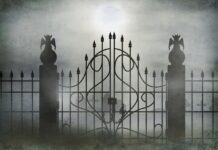I’m so excited and honored to be offered the opportunity to share my words with the fascinating collection of writers and activists that is coming together on this website! Some of you might know me from co-founding The Icarus Project, an online community, real-life support network, and alternative media project by and for people living with the complex gifts that are too often labeled as “mental illness.” Some of you might know me as the artist and activist featured in the film Crooked Beauty. And some of you might not know that I’m also a poet. I’ve been asked to share my work here on Mad in America.
Much of the writing is drawn from my book Inbetweenland, which is being released this coming March (2013). The book’s description will give you a sense of where I’m often coming from in much of my work:
“Part love song, part howl, part incantation, Inbetweenland is the first book-length collection of Jacks McNamara’s poems, essays, and hybrid experiments in the neon vernacular of being alive. Mapping out radical trajectories through loss, violence, and queer desire, McNamara creates a luminous archive of survival and resilience in a self-destructing world. A visual artist as well as a writer, the author relies heavily on the unexpected image to chronicle the impossible journey through body, family, and history–towards home. From the borderlands of madness to the unpredictable shape of peace, Inbetweenland bears unflinching witness to a rarely charted geography, offering the reader a resonant poetics of insurrection and grace.”
I believe most of us have a broken heart not a “mental illness.” This first poem I’m going to offer you is about trauma and resilience; the ways that the world breaks our hearts, and the ways we survive to find our voices again. Trigger warning: the poem includes some pretty graphic writing about death.
the archaeology of snow
1
I remember the way the Western sun
would light up the negative spaces
between the leaves of the very first house plant
I ever managed to keep alive
in the first place that felt like a home.
My bedroom window faced 10,000 other houses
stacked up on the hill that kept back the fog,
San Francisco afternoons creating space to stop
leaving for the first time in 22 years.
I learned to paint lichens, lightning, and candles.
Wings with taproots.
Rivers the color of bruise. Inevitably
one housemate got pregnant and rented
a tiny apartment with the boy downstairs.
Another moved back to Texas and I
gave everything away
moved into the bed of my truck.
2
California has too many freeways
and never enough snow.
The long summer of 2005 was broken by fantasies
of winter, exploded roses on my skin,
and the beginning of seizures
when overexposed filmstills from 1985
began to erupt out of my spine.
The psychic called it kundalini rising.
The homeopath gave me snake venom.
The psychiatrist called it a liability
and dropped me because I was a suicide risk.
When I visited back east I drank wine in the morning
slept with my best friend’s girlfriend
could eat nothing but fried chicken for days.
When I returned to California
I could not find the light switches
in my room. I spent mornings drawing birds
on telephone wires, instead of going to work.
When the fog closed over August
I decided to move to apple country
in mid-October, when the leaves would be full of flames.
3
After apple country froze solid and thawed
slowly, my mother down south began to die.
She did not do it gracefully. Her organs failed
on a Sunday, while I was milking a goat.
Come home now. Board the train
back to a state saturated with corporate
headquarters where there used to be horse pastures,
a damp yard where the garage smells like a hospital
and mothers are filled with stale blood.
Attached to machines while their feet turn black
and their bellies swell with the sepsis
that looks like lost children. I become certain
her last words are a bitter critique of my haircut
until she rises from the nearly dead and glows
through cheeks her favorite shade of fuchsia.
Eating nothing but canned peaches and cottage cheese
for 6 weeks, sitting up until summer is starving the crops
and she lays back down.
I find myself holding her hand
while she suffocates in the living room
where she used to drink cheap wine.
She leaves us to withstand
the next year’s blizzards alone.
4
California was a relief again after all that snow.
The misplaced palm trees, the flat anonymous sun,
the queers dressing their dogs in hooded sweatshirts.
You could get lost with the anarchists
eating 30 pounds of dumpstered chocolate
in a warehouse with boards over the windows
or become invisible with the Buddhists
facing walls or stripping paint
in silence. In the used bookstore on 16th
where the peacefountain by the register
bubbled loud enough to drown
out the neighboring taqueria and the SRO
the owner, a complete stranger, handed me
100 sheets of crumpled Rumi
to keep me company until 8:37 am
when the daily mariachi music
drifted up through the floorboards of my room
from the dollar store downstairs. In that bookshop
I found the volume of poetry that broke
my voice open again, and showed me
how to write down the unrelenting itch
and ache of exile in crowded land, the sugar
in the vortex of a passionflower, the sound
of the dead with their heavy feet
pacing the roof upstairs
keeping me awake all night.
(If you would like to pre-order a copy of my book or make a donation to support this new independent press so that they can actually afford to publish the book, please visit the Deviant Type Press Indiegogo fundraising page and share it with your friends!)















Thank you for posting this beautiful poem, Jacks. You are an inspiration to all!
Report comment
Jacks, I’ll be waiting eagerly to read more. Your poetry is so genuine, such an accurate and powerful expression of the experience of many of us, all the same in spirit if not in details.
And I’m happy that Mad in America has moved forward to publish more artistic work by survivors.
Report comment
Jacks, thank you for sharing your beautiful and sad and mysterious poem. It is leaving me a bit breathless, still smelling sugar in the passionflower and wiping discarded chocolate and memories from my lips. Although your heart may have been broken, it is also beautiful and alchemal and rising. Thank you for sharing it and reminding me of Rumi and our true home…
Report comment
The section of your poem about your mother’s death certainly captured my experience as I sat with my dying mother. Except that in my situation the process took seventeen months. It’s so frustrating and sad because there is absolutely not one thing you can do to “help” other than to just be present and be witness to their final work. Only they can do what is taking place; it is their one last piece of work in this world. You captured it perfectly.
I like the entire poem. Like so many of the people who post here you have a way with words and write in ways that evoke clear images that me me feel as if I’m standing there next to you in the experience. I look forward to reading more of your poetry.
Report comment
you are right: it is a broken heart that sends most people into madness
Report comment
The connection between creativity and mania are very intriguing.
At a 1999 NAMI convention I had the opportunity to meet Pulitzer Prize-Winning Author William Styron. He spoke about suffering from depression and his book Darkness Visible. In front of an audience of over 500 people I asked if he could relate to manic symptoms during extended periods of intense writing and if he thought a more accurate description of his condition was manic-depression. He thought on that for a few moments before answering. His answer seemed to shock everyone, including himself. He said “Yes, yes, I can relate to manic highs and I do think a more accurate description is manic-depression.”
It is important to consider many aspects to intense mental states, including stress from relationships. Kirk Douglas gave a brilliant performance playing Vincent Van Gogh in “Lust for Life”. It is a must see for anyone labeled “mentally ill”. Van Gogh’s art an writing indicate the torment he suffered. Although, another contributing factor we must consider is lead poisoning.
Many artists continue to work around chemical solvents such as toluene and n-hexane that can cause neuropsychiatric disorders.
“Because Van Gogh used lead based paints there are some who believe he suffered from lead poisoning from nibbling at paint chips. It was also noted by Dr. Peyron that during his attacks Van Gogh tried to poison himself by swallowing paint or drinking kerosene. One of the symptoms of lead poisoning is swelling of the retinas which can cause one to see light in circles like halos around objects. This can be seen in paintings like The Starry Night.”
posted on Mad in America 12/6/2012
Report comment
Hello. I enjoyed reading this piece, having contributed poetry of my own to other recovery minded sites.
I am writing here not to specifically address this blog entry but to address something that is important to me, and I wonder if is important to others.
We spend an awful lot of time here speaking of how psychiatrists and other professionals just aren’t getting it, however, each blog entry writer has the letters M.D., PhD or MSW after their name. Perhaps my suggestion sounds ludicrous but imagine a world where we did not feel compelled to type in our credentials, where the letters after my own name and others were not included in our writing. Would we interpret what the author’s words mean differently? If WE ALL dropped the b.s. titles – psychologist, social worker, what have you, and just said what we wanted to say without needing to back it up with the “sacred titles” that follow our names, I would have to think that those consumers out there would not feel the same power structure reading blog entries just as they experience when seeing their mental health workers in the “real world.”
I made a decision after I received my graduate degree recently, that if and when I give a talk before a group of colleagues, consumers, etc, I won’t mention my “credentials” so that everyone is my equal and I am everyone elses equal with whom I am with.
I challenge those out there blogging to follow this lead and take this seriously, if we are serious about changing the power structure than start here and let’s talk without our titles. That is my challenge.
Report comment
Re: “broken hearts”
Have we lost touch with the basics?
Have we forgotten that *love* is the greatest healer?
Thank you for opening your heart.
Duane
Report comment
i know california and texas and women, death, dying, loss and a breaking heart well. maybe we can talk about setting people free and the juxtaposition of madness and love in our interview when you’re in asheville. there’s supposed to be a hard freeze according to the farmer’s almanac late spring.
Report comment